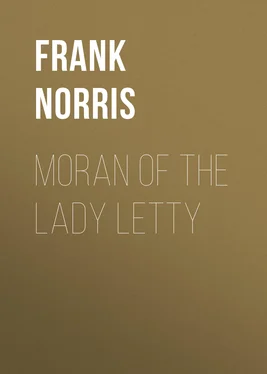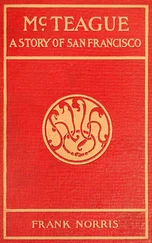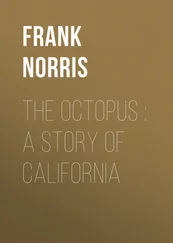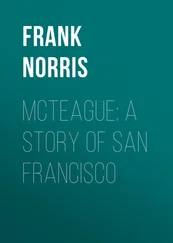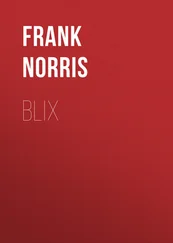Frank Norris - Moran of the Lady Letty
Здесь есть возможность читать онлайн «Frank Norris - Moran of the Lady Letty» — ознакомительный отрывок электронной книги совершенно бесплатно, а после прочтения отрывка купить полную версию. В некоторых случаях можно слушать аудио, скачать через торрент в формате fb2 и присутствует краткое содержание. Жанр: Прочие приключения, Прочие приключения, literature_19, foreign_antique, foreign_prose, на английском языке. Описание произведения, (предисловие) а так же отзывы посетителей доступны на портале библиотеки ЛибКат.
- Название:Moran of the Lady Letty
- Автор:
- Жанр:
- Год:неизвестен
- ISBN:нет данных
- Рейтинг книги:3 / 5. Голосов: 1
-
Избранное:Добавить в избранное
- Отзывы:
-
Ваша оценка:
- 60
- 1
- 2
- 3
- 4
- 5
Moran of the Lady Letty: краткое содержание, описание и аннотация
Предлагаем к чтению аннотацию, описание, краткое содержание или предисловие (зависит от того, что написал сам автор книги «Moran of the Lady Letty»). Если вы не нашли необходимую информацию о книге — напишите в комментариях, мы постараемся отыскать её.
Moran of the Lady Letty — читать онлайн ознакомительный отрывок
Ниже представлен текст книги, разбитый по страницам. Система сохранения места последней прочитанной страницы, позволяет с удобством читать онлайн бесплатно книгу «Moran of the Lady Letty», без необходимости каждый раз заново искать на чём Вы остановились. Поставьте закладку, и сможете в любой момент перейти на страницу, на которой закончили чтение.
Интервал:
Закладка:
By this time the Captain, Wilbur, and all on board could plainly make out a sail some eight miles off the starboard bow. Even at that distance, and to eyes so inexperienced as those of Wilbur, it needed but a glance to know that something was wrong with her. It was not that she failed to ride the waves with even keel, it was not that her rigging was in disarray, nor that her sails were disordered. Her distance was too great to make out such details. But in precisely the same manner as a trained physician glances at a doomed patient, and from that indefinable look in the face of him and the eyes of him pronounces the verdict “death,” so Kitchell took in the stranger with a single comprehensive glance, and exclaimed:
“Wreck!”
“Yas, sah. I tink-um velly sick.”
“Oh, go to ‘ll, or go below and fetch up my glass—hustle!”
The glass was brought. “Son,” exclaimed Kitchell—“where is that man with the brains? Son, come aloft here with me.” The two clambered up the ratlines to the crow’s nest. Kitchell adjusted the glass.
“She’s a bark,” he muttered, “iron built—about seven hundred tons, I guess—in distress. There’s her ensign upside down at the mizz’nhead—looks like Norway—an’ her distress signals on the spanker gaff. Take a blink at her, son—what do you make her out? Lord, she’s ridin’ high.”
Wilbur took the glass, catching the stranger after several clumsy attempts. She was, as Captain Kitchell had announced, a bark, and, to judge by her flag, evidently Norwegian.
“How she rolls!” muttered Wilbur.
“That’s what I can’t make out,” answered Kitchell. “A bark such as she ain’t ought to roll thata way; her ballast’d steady her.”
“What’s the flags on that boom aft—one’s red and white and square-shaped, and the other’s the same color, only swallow-tail in shape?”
“That’s H. B., meanin: ‘I am in need of assistance.’”
“Well, where’s the crew? I don’t see anybody on board.”
“Oh, they’re there right enough.”
“Then they’re pretty well concealed about the premises,” turned Wilbur, as he passed the glass to the Captain.
“She does seem kinda empty,” said the Captain in a moment, with a sudden show of interest that Wilbur failed to understand.
“An’ where’s her boats?” continued Kitchell. “I don’t just quite make out any boats at all.” There was a long silence.
“Seems to be a sort of haze over her,” observed Wilbur.
“I noticed that, air kinda quivers oily-like. No boats, no boats—an’ I can’t see anybody aboard.” Suddenly Kitchell lowered the glass and turned to Wilbur. He was a different man. There was a new shine in his eyes, a wicked line appeared over the nose, the jaw grew salient, prognathous.
“Son,” he exclaimed, gimleting Wilbur with his contracted eyes; “I have reemarked as how you had brains. I kin fool the coolies, but I can’t fool you. It looks to me as if that bark yonder was a derelict; an’ do you know what that means to us? Chaw on it a turn.”
“A derelict?”
“If there’s a crew on board they’re concealed from the public gaze—an’ where are the boats then? I figger she’s an abandoned derelict. Do you know what that means for us—for you and I? It means,” and gripping Wilbur by the shoulders, he spoke the word into his face with a savage intensity. “It means salvage, do you savvy?—salvage, salvage. Do you figger what salvage on a seven-hundred-tonner would come to? Well, just lemmee drop it into your think tank, an’ lay to what I say. It’s all the ways from fifty to seventy thousand dollars, whatever her cargo is; call it sixty thousand—thirty thou’ apiece. Oh, I don’t know!” he exclaimed, lapsing to landman’s slang. “Wha’d I say about a million to one on the unexpected at sea?”
“Thirty thousand!” exclaimed Wilbur, without thought as yet.
“Now y’r singin’ songs,” cried the Captain. “Listen to me, son,” he went on, rapidly shutting up the glass and thrusting it back in the case; “my name’s Kitchell, and I’m hog right through.” He emphasized the words with a leveled forefinger, his eyes flashing. “H—O—G spells very truly yours, Alvinza Kitchell—ninety-nine swine an’ me make a hundred swine. I’m a shoat with both feet in the trough, first, last, an’ always. If that bark’s abandoned, an’ I says she is, she’s ours. I’m out for anything that there’s stuff in. I guess I’m more of a beach-comber by nature than anything else. If she’s abandoned she belongs to us. To ‘ll with this coolie game. We’ll go beach-combin’, you and I. We’ll board that bark and work her into the nearest port—San Diego, I guess—and get the salvage on her if we have to swim in her. Are you with me?” he held out his hand. The man was positively trembling from head to heel. It was impossible to resist the excitement of the situation, its novelty—the high crow’s nest of the schooner, the keen salt air, the Chinamen grouped far below, the indigo of the warm ocean, and out yonder the forsaken derelict, rolling her light hull till the garboard streak flashed in the sun.
“Well, of course, I’m with you, Cap,” exclaimed Wilbur, gripping Kitchell’s hand. “When there’s thirty thousand to be had for the asking I guess I’m a ‘na’chel bawn’ beach-comber myself.”
“Now, nothing about this to the coolies.”
“But how will you make out with your owners, the Six Companies? Aren’t you bound to bring the ‘Bertha’ in?”
“Rot my owners!” exclaimed Kitchell. “I ain’t a skipper of no oil-boat any longer. I’m a beach-comber.” He fixed the wallowing bark with glistening eyes. “Gawd strike me,” he murmured, “ain’t she a daisy? It’s a little Klondike. Come on, son.”
The two went down the ratlines, and Kitchell ordered a couple of the hands into the dory that had been rowing astern. He and Wilbur followed. Charlie was left on board, with directions to lay the schooner to. The dory flew over the water, Wilbur setting the stroke. In a few moments she was well up with the bark. Though a larger boat than the “Bertha Millner,” she was rolling in lamentable fashion, and every laboring heave showed her bottom incrusted with barnacles and seaweed.
Her fore and main tops’ls and to’gallants’ls were set, as also were her lower stays’ls and royals. But the braces seemed to have parted, and the yards were swinging back and forth in their ties. The spanker was brailed up, and the spanker boom thrashed idly over the poop as the bark rolled and rolled and rolled. The mainmast was working in its shoe, the rigging and backstays sagged. An air of abandonment, of unspeakable loneliness, of abomination hung about her. Never had Wilbur seen anything more utterly alone. Within three lengths the Captain rose in his place and shouted:
“Bark ahoy!” There was no answer. Thrice he repeated the call, and thrice the dismal thrashing of the spanker boom and the flapping of the sails was the only answer. Kitchell turned to Wilbur in triumph. “I guess she’s ours,” he whispered. They were now close enough to make out the bark’s name upon her counter, “Lady Letty,” and Wilbur was in the act of reading it aloud, when a huge brown dorsal fin, like the triangular sail of a lugger, cut the water between the dory and the bark.
“Shark!” said Kitchell; “and there’s another!” he exclaimed in the next instant, “and another! Strike me, the water’s alive with ‘em’! There’s a stiff on the bark, you can lay to that”; and at that, acting on some strange impulse, he called again, “Bark ahoy!” There was no response.
The dory was now well up to the derelict, and pretty soon a prolonged and vibratory hissing noise, strident, insistent, smote upon their ears.
Читать дальшеИнтервал:
Закладка:
Похожие книги на «Moran of the Lady Letty»
Представляем Вашему вниманию похожие книги на «Moran of the Lady Letty» списком для выбора. Мы отобрали схожую по названию и смыслу литературу в надежде предоставить читателям больше вариантов отыскать новые, интересные, ещё непрочитанные произведения.
Обсуждение, отзывы о книге «Moran of the Lady Letty» и просто собственные мнения читателей. Оставьте ваши комментарии, напишите, что Вы думаете о произведении, его смысле или главных героях. Укажите что конкретно понравилось, а что нет, и почему Вы так считаете.
